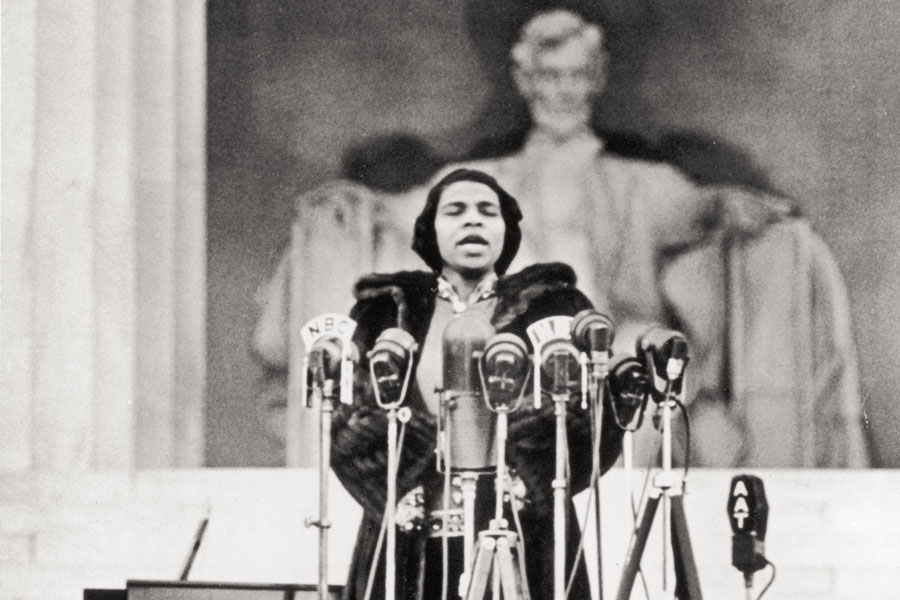Philly’s Marian Anderson Is Getting Some Long-Overdue Love
Eighty years ago this month, the world’s most famous singer became a civil rights icon.

Marian Anderson at her defining moment, Easter 1939. Photograph by Hulton Archive/Stringer/Getty Images
One of the pitfalls of living in a city so well stocked with Historical Characters of Great Import (HCGIs) is that many compelling figures fade into the collective shadow of white guys in breeches. Case in point: When the U.S. Treasury announced three years ago that Marian Anderson would appear on the new $5 bill, the typical response — particularly among younger Philadelphians — was a resounding “Wait, who?”
Born in South Philly in 1897, Anderson was the 20th century’s Beyoncé, an opera superstar who sold out concerts around the globe, entertained presidents and kings, and brought audiences to tears singing Verdi and Schubert along with black spirituals. Her warm, clear contralto was famously described by conductor Arturo Toscanini as a voice heard “once in a hundred years.”
Though she rose to fame in (and despite) Jim Crow America, Anderson rarely discussed the indignities of racism that she endured. But 80 years ago this month, the course of history was permanently altered. After the Daughters of the American Revolution refused Anderson the stage at Washington, D.C.’s segregated Constitution Hall, First Lady Eleanor Roosevelt helped arrange for her to sing instead at the Lincoln Memorial on Easter Sunday 1939 — turning the world’s most famous singer into a civil rights icon.
“I had become, whether I liked it or not, a symbol representing my people,” Anderson later wrote. Before a crowd of 75,000, she sang seven songs — a brief concert with outsize impact. When she died in 1993 at age 96, she’d racked up honors ranging from the Grammys’ Lifetime Achievement Award to the Presidential Medal of Freedom.
How, then, has Anderson been so generally, well, unsung in recent decades? “She’s a classical performer,” says David McKnight, director of Penn’s Rare Book and Manuscript Library, where most of her archives are housed. It’s not the favorite genre of today’s audiences, he notes: “So maybe she’s been a little lost in that regard.”
Then again, Americans have a way of eventually rallying to lost, compelling HCGIs (witness the going rate for Hamilton tickets), and Anderson might be primed for a comeback. There’s been a considerable uptick of interest lately, McKnight reports, beginning with his own library, which recently won a grant to digitize a significant chunk of Anderson’s archives.
Also in the works: a PBS “American Masters” documentary by decorated director Philip Gittelman, who first filmed Anderson in the 1960s. He was struck, he says, by her combination of talent and self-effacement: “I’ve been looking for a way to tell her story ever since.” (His work is still in early stages.)
Meantime, local filmmaker Bill Nicoletti debuted his documentary, Once in a Hundred Years: The Life & Legacy of Marian Anderson, at the Kimmel in February. This month, the National Constitution Center partners with Grad Hospital’s Marian Anderson Museum to commemorate the Easter concert with a one-day event featuring performers singing from Anderson’s catalog.
Beyond anything else, it’s the national zeitgeist — our new conversations about race and diversity — that’s really set the stage for this Marian moment, says Elkin Antoniou. She’s the co-founder of New York’s Liquid Theatre Collective, which has exclusive stage rights to Penn’s archives; Marian (working title), the musical is in progress now. If all goes well over the next few years, the Collective hopes you’ll be able to see shows in New York, Philly and D.C.
“Marian was at the forefront before any of this was even a conversation,” Antoniou says. “So yes, now seems like a crucial time to tell her story.”
Published as “Marian on Our Minds” in the April 2019 issue of Philadelphia magazine.


